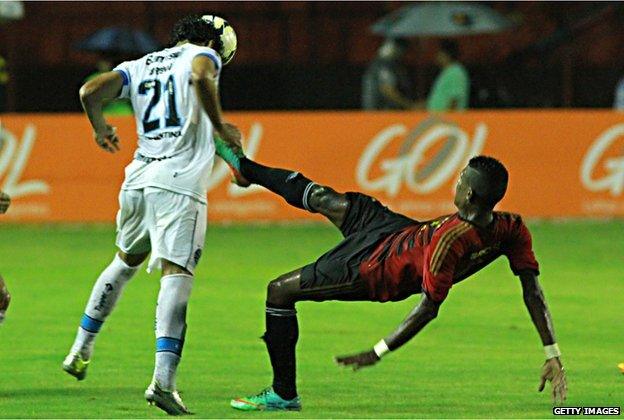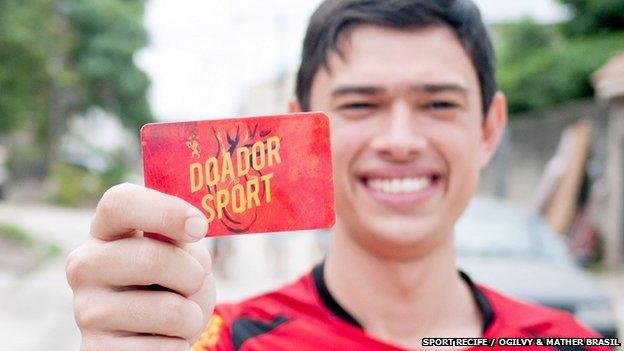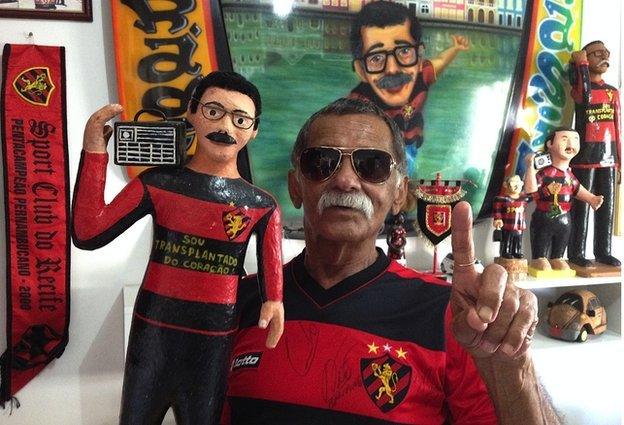How thousands of football fans are helping to save lives
- Published

A campaign by one of Brazil's biggest football clubs to encourage fans to become organ donors has led to a massive rise in the number of life-changing transplants and reduced waiting lists for organs in the area almost to zero.
"Every Brazilian is born with football in the soul," says Jorge Peixoto, of Sport Club Recife, one of the top teams in the north-east of the country.
For the last two years though, he has been more concerned about what happens to fans' bodies when they die.
The club decided it "must look beyond the 11 players on the field and use its power for bigger things," says Peixoto, the club's vice-president for social programmes.
It asked them to become "immortal fans" donating their organs after they die so that their love for the club will live on in someone else's body.

"I promise that your eyes will keep on watching Sport Club Recife," says one man waiting for a cornea transplant in the television ad made to publicise the campaign.
"I promise that your heart will keep on beating for Sport Club Recife," says a potential recipient of a transplanted heart.
The video is screened at every match in the club's Ilha do Retiro stadium, a venue that seats 35,000 but could be filled almost twice over with the number of people who have signed up for a donor card - 66,000 so far.
The waiting list for organ transplants in the city of Recife was reduced to zero in the first year, Peixoto says, and the impact has also been felt throughout the surrounding state of Pernambuco.
"We used to perform from five to seven heart transplants a year, but last year we achieved 28… it was an incredible increase," says Fernando Figueira, director of heart transplants at Pernambuco's Institute of Integrated Medicine.
"There is a very tight connection between the campaign and this rise."
People can apply online for the Sport Donor card - it's the size of a credit card, the words printed over the outline of a heart with a fiery red backdrop.

According to Brazilian law, it's up to the family to decide whether the organs of their loved ones will be donated after their death. But making this decision is not easy in such painful moments.
"The families have to give their consent, but we end up having large rates of refusals. The card makes people discuss the matter with their parents or spouse. If they die, they will know they would have liked to be a donor," says Figueira.
The success of the campaign has been noticed around the world and Sport Recife has been contacted by Paris Saint-Germain and Barcelona, both thinking about adopting similar campaigns, Peixoto says.
He hopes the forthcoming World Cup will help spread the idea further.
A natural poster boy for the campaign was one of Sport Recife's most famous fans, 69-year-old Ivaldo Firmino dos Santos, who received a heart transplant 12 years ago.

Known as Ze do Radio (Radio Joe), he's earned a reputation as Brazil's most irritating football fan, for playing his radio very loud behind the opposition team benches.
He waited five months and 14 days for a new heart and remembers the moment the phone call came. "On 1 March 2002 at 19:13, the doctor called and said he had a heart for me."
He now celebrates two birthdays - the second is on the day when his surgery was successfully performed and he received his new heart "made of iron... I still go to all the Sport Recife matches and my heart can handle all that feeling!"
Ze do Radio now tries to persuade fellow fans to sign up for the card, and when they do he has another message for them.
"I tell them: 'Hey, man! When you are at home having some whisky with your family, tell everyone that you are an organ donor.' It's not just about signing up, you have to spread the news.
"Tell them that when you die, you want to donate everything. Or else you'll come back and pull their leg in their sleep!"
It's not just about club loyalty though. Daniele Dias Pessoa, 32, supports one of Recife's other clubs, Santa Cruz, but also decided to lend her face to her bitter rivals' campaign.
Pessoa's mother died of a stroke two years ago and she fulfilled her wishes, donating five of her organs.
"It was a very hard decision but it's an act of love. Thanks to her, five people could finally leave the waiting list for a transplant," she says.
Her mother was also a Santa Cruz supporter, but, says Pessoa, "I'm sure she wouldn't have cared if her organs went to a Sport Recife fan."
Follow @BBCNewsMagazine, external on Twitter and on Facebook, external